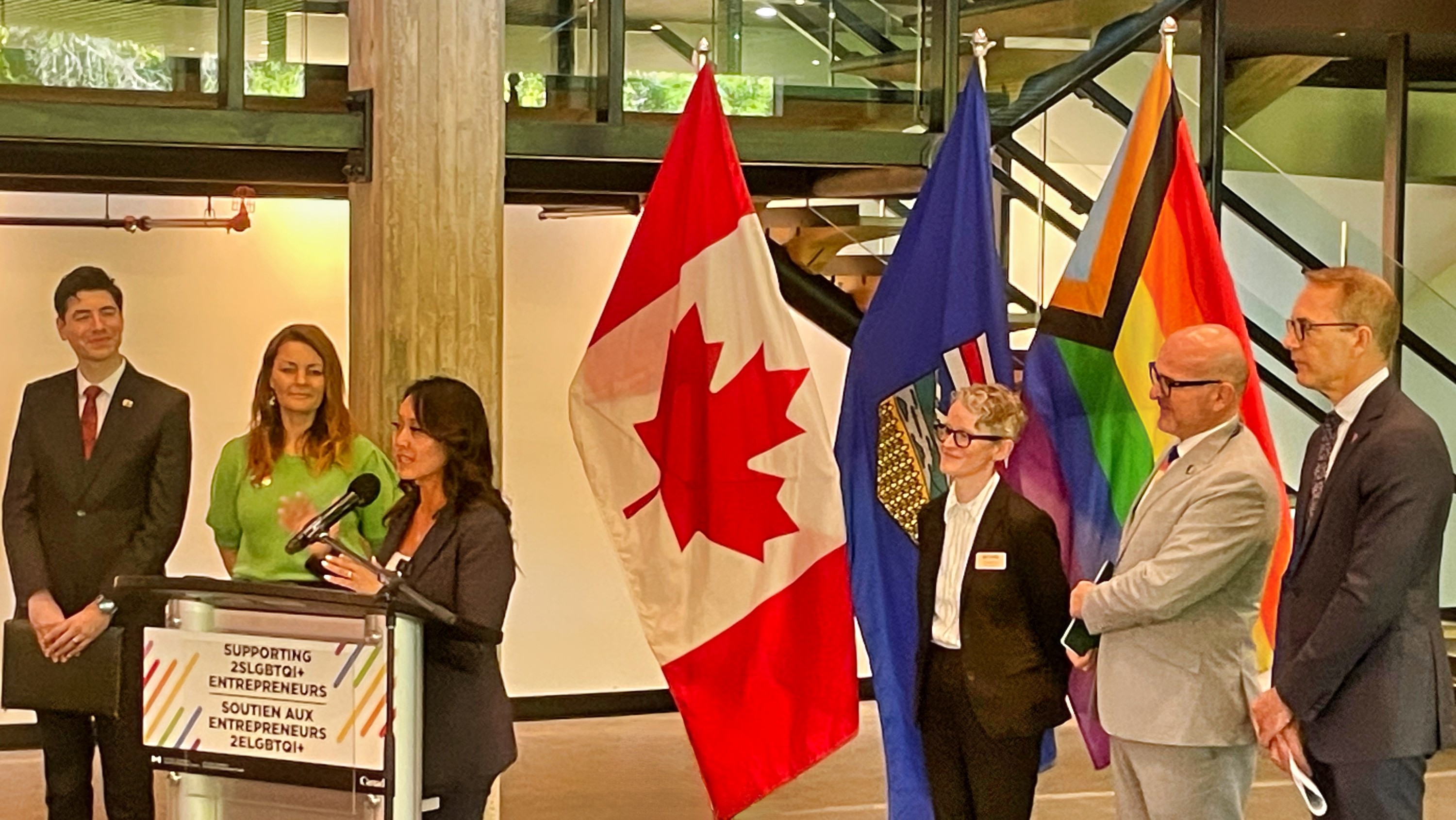The University of Alberta is leading a new national network to help 2SLGBTQI+ entrepreneurs and business owners prosper and thrive.
The 2SLGBTQI+ Knowledge Hub aims to identify systemic barriers to success while bolstering community-led and engaged intervention programming.
The hub, supported by the Canadian government and Canada’s 2SLGBTQI+ Chamber of Commerce (CGLCC), will also provide research and resources to help Canadians understand the entrepreneurial ecosystem and the challenges 2SLGBTQI+ entrepreneurs and businesses face, whether starting a company or non-profit organization.
“Our government is so proud to have created Canada’s first-ever 2SLGBTQI+ Entrepreneurship Program alongside the 2SLGBTQI+ community, and funded the 2SLGBTQI+ Knowledge Hub, led by the University of Alberta,” says Rechie Valdez, minister of small business, who was at the U of A today along with Randy Boissonnault, minister of employment, workforce development and official languages, to announce the launch of the hub.
“We look forward to working with the U of A to collect critical data on the current entrepreneurial landscape for 2SLGBTQI+ communities across the country, which will help develop best practices and tools to help 2SLGBTQI+ entrepreneurs thrive and grow their businesses,” Valdez adds. “2SLGBTQI+ entrepreneurs make invaluable contributions to their communities across the country, employ over 435,000 Canadians, and generate billions in economic activity — yet still face systemic barriers when deciding to follow their dreams of opening a small business. Our government is dedicated to changing this reality and will always champion 2SLGBTQI+ entrepreneurs and empower their full inclusion and participation in our economy.”
Darrell Schuurman, CEO of CGLCC, notes that announcing the U of A as the recipient of the 2SLGBTQI+ Knowledge Hub funding “marks a significant milestone in our quest for evidence-based advocacy and policy-making within the 2SLGBTQI+ entrepreneur community.
“By investing in research and knowledge creation, we empower our community to effect positive change and foster a more equitable society.”
“We spend so much time talking about the struggles of our community — the suffering, stigma, mental illness and suicide. But this allows us to see it through a more positive lens — to identify what people need and make it happen for them,” says project lead Glynnis Lieb, executive director of the U of A’s Fyrefly Institute for Gender and Sexual Diversity.
The hub will create a national, intersectional network of Indigenous, English and French academics, activists, business owners, entrepreneurs, industry leaders and youth in rural, northern and urban settings, says Lieb. It will also include Black and other racialized communities, disabled entrepreneurs and women.
The U of A is uniquely positioned to lead the network, says Lieb, as its College of Social Sciences and Humanities is home to both the Fyrefly Institute in the Faculty of Education and the eHUB Entrepreneurship Centre in the Alberta School of Business, as well as campus partners UAlberta North, the Faculty of Native Studies and Campus Saint-Jean.
The project will also involve the MacEwan Centre for Sexual and Gender Diversity at MacEwan University, the Edmonton 2 Spirit Society, the University of Toronto’s Institute for Gender and the Economy, Research Impact Canada, The 519, the Queer Yukon Society and researcher Amelia Christine Thorpe at the University of New Brunswick.
For the first two years, the hub will identify barriers to success in the business sector and assess what the 2SLGBTQI+ community needs most to thrive across the country, says Lieb.
“What happens, for example, when you out yourself or when you transition?” says Lieb. “We’ve worked with many folks who have lost opportunities, or been bullied or ostracized after they’ve transitioned or based on their gender identity.”
While Lieb will direct the community mobilization and activation side of the project, Michael Lounsbury in the School of Business will oversee its research agenda, which includes identifying existing research gaps, conducting investigations to improve data and enable social change, and producing a minimum of four publications.
Lounsbury is currently the academic director of the eHUB Entrepreneurship Centre, which provides students with collaborative and interdisciplinary educational opportunities to enhance their entrepreneurial skills. He is also an expert in the emerging field of emancipatory entrepreneurship, or “the potential of entrepreneurship to drive social change and promote the emancipation of marginalized or oppressed groups,” he says.
“More attention needs to be directed towards understanding how constraints are removed, rather than how opportunities are identified,” he explains, noting that these constraints can be psychological, economic, social, institutional or cultural.
“Emancipatory entrepreneurship involves the breaking down of such barriers to facilitate the creation of businesses or initiatives that challenge existing power structures, address social inequalities and provide opportunities for individuals to achieve economic and social freedom.”
U of A president Bill Flanagan says the hub reflects the university’s commitment to community-engaged research outlined in its strategic plans, Shape: A Strategic Plan of Impact, Forward with Purpose: A Strategic Plan for Research and Innovation, and Braiding Past, Present and Future: University of Alberta Indigenous Strategic Plan.
“The 2SLGBTQI+ Knowledge Hub aligns with the U of A’s mission to engage with groups and individuals who have historically experienced exclusion from, and barriers to, accessing economic opportunities in our society,” says Flanagan.
